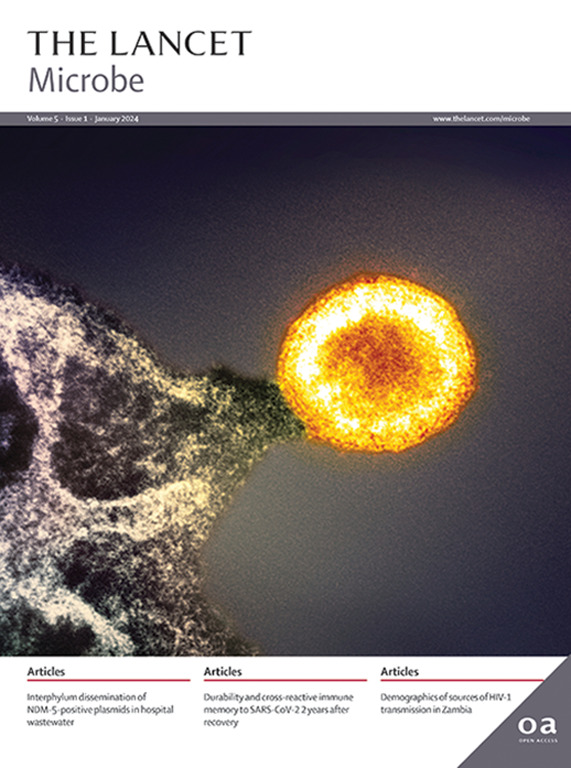一种二价埃博拉病毒和苏丹病毒ChAdOx1载体疫苗在英国成人中的安全性和免疫原性:一项开放标签、非随机、首次人体i期临床试验
IF 20.9
1区 生物学
Q1 INFECTIOUS DISEASES
引用次数: 0
摘要
背景:四种正埃博拉病毒可引起埃博拉病,其中埃博拉病毒(扎伊尔正埃博拉病毒种)和苏丹病毒(苏丹正埃博拉病毒种)造成了大多数暴发和病例。除埃博拉病毒外,还没有批准针对正埃博拉病毒的疫苗。我们的目的是评估一种编码埃博拉病毒和苏丹病毒糖蛋白的非复制单腺病毒疫苗(ChAdOx1 biEBOV)的安全性和免疫原性。方法:在这项开放标签、非随机、首次人体、剂量递增的ChAdOx1 biEBOV临床试验中,在一个单一地点招募年龄在18-55岁、无临床显著医学合并症或既往腺病毒疫苗暴露的参与者(Oxford, UK)。参与者被非随机纳入低剂量组(ChAdOx1 biEBOV的5 × 10⁹病毒颗粒[vp]),中剂量组(2.5 × 101⁰vp)和高剂量组(5 × 101⁰vp)。所有剂量均为肌肉注射。在招募所有参与者后,对方案进行了修改,以便高剂量组的一个亚组在第一次剂量后12周接受第二次高剂量疫苗。主要结局指标是评估接种疫苗后7天的主动不良事件,接种疫苗后28天的主动不良事件,接种疫苗后28天内临床实验室测量的变化,以及研究期间的严重不良事件和特别关注的不良事件。次要结果是评估埃博拉病毒和苏丹病毒糖蛋白的体液和细胞免疫。该研究已在ClinicalTrials.gov注册,编号NCT05079750。结果:在2021年11月11日至2022年4月7日期间,40人参加了试验筛选访问,其中26人入选(低剂量组6人,中剂量组6人,高剂量组14人)。高剂量组的七名参与者接种了一剂疫苗,七名接种了两剂疫苗。26名受试者中有17名(65%)在剂量1后报告了当地征求的不良事件,7名受试者中有5名(71%)在剂量2后报告了当地征求的不良事件。在剂量1和剂量2后,分别有23名(88%)和5名(71%)参与者报告了系统性不良事件。所有不良事件均为轻度或中度,无严重事件报道。未见严重不良反应。与疫苗接种相关的主动不良事件大多是轻度或中度和短暂的,如关节疼痛或上呼吸道症状。在高剂量组中,一名参与者短暂发生了一种特殊的不良事件,血小板减少症。快速解决淋巴细胞减少症在疫苗接种后的早期时间点很常见。单次5 × 101⁰vp剂量疫苗接种在高剂量组中引起14名(100%)参与者对埃博拉病毒血清阳性,在高剂量组中引起12名(86%)参与者对苏丹病毒血清阳性;两剂量组抗体滴度提高。解释:我们的结果表明ChAdOx1 bibov疫苗是安全且耐受性良好的。安全性和耐受性数据与使用相同疫苗骨架的其他疫苗一致。单剂5 × 101⁰vp疫苗具有免疫原性,可产生针对埃博拉病毒和苏丹病毒糖蛋白的结合抗体,在接受第二次免疫的亚组中,抗体反应增强。未来的研究应侧重于增强抗体反应和产生针对苏丹病毒的中和抗体的方法。资助:英国研究与创新。本文章由计算机程序翻译,如有差异,请以英文原文为准。
Safety and immunogenicity of a bivalent Ebola virus and Sudan virus ChAdOx1 vectored vaccine in adults in the UK: an open-label, non-randomised, first-in-human, phase 1 clinical trial
Background
Four Orthoebolavirus species can cause Ebola disease, with Ebola virus (species Orthoebolavirus zairense) and Sudan virus (species Orthoebolavirus sudanense) responsible for the majority of outbreaks and cases. No vaccines have been approved against orthoebolaviruses other than Ebola virus. We aimed to evaluate the safety and immunogenicity of a non-replicating single-adenoviral vaccine (ChAdOx1 biEBOV) encoding both Ebola virus and Sudan virus glycoproteins.
Methods
In this open-label, non-randomised, first-in-human, phase 1, dose-escalation clinical trial of ChAdOx1 biEBOV, participants aged 18–55 years without clinically significant medical comorbidities or previous adenovirus vaccine exposure were recruited at a single site (Oxford, UK). Participants were non-randomly enrolled to a low-dose group (5 × 10⁹ viral particles [vp] of ChAdOx1 biEBOV), a medium-dose group (2·5 × 101⁰ vp), and a high-dose group (5 × 101⁰ vp). All doses were administered intramuscularly. After recruitment of all participants, the protocol was amended so that a subgroup from the high-dose group received a second high dose of vaccine 12 weeks after the first dose. Primary outcome measures were assessment of solicited adverse events for 7 days after vaccinations, unsolicited adverse events for 28 days after vaccinations, changes in clinical laboratory measures within 28 days after vaccination, and serious adverse events and adverse events of special interest for the study duration. Secondary outcomes were assessment of humoral and cellular immunity to Ebola virus and Sudan virus glycoprotein. This study is registered with ClinicalTrials.gov, NCT05079750.
Findings
Between Nov 11, 2021, and April 7, 2022, 40 individuals attended the trial screening visit, of whom 26 were enrolled (six in the low-dose group, six in the medium-dose group, and 14 in the high-dose group). Seven participants in the high-dose group received one vaccine dose and seven received two vaccine doses. Local solicited adverse events were reported by 17 (65%) of 26 participants after dose 1 and five (71%) of seven after dose 2. Systemic solicited adverse events were reported by 23 (88%) participants after dose 1 and five (71%) after dose 2. All solicited adverse events were mild or moderate, with no severe events reported. No serious adverse reactions were reported. Unsolicited adverse events related to vaccination were mostly mild or moderate and short-lived, such as joint pain or upper respiratory symptoms. One adverse event of special interest, thrombocytopenia, occurred transiently in one participant in the high-dose group. Rapidly resolving lymphopenia was common at the early post-vaccination timepoint. A single 5 × 101⁰ vp dose vaccination elicited seropositivity to Ebola virus in 14 (100%) participants in the high-dose group and elicited seropositivity to Sudan virus in 12 (86%) participants in the high-dose group; antibody titres were boosted in the two-dose group.
Interpretation
Our results suggest that the ChAdOx1 biEBOV vaccine was safe and well tolerated. Safety and tolerability data are consistent with other vaccines using the same vaccine backbone. A single 5 × 101⁰ vp dose of the vaccine was immunogenic, generating binding antibodies against both Ebola virus and Sudan virus glycoproteins, with antibody responses boosted in the subgroup receiving a second immunisation. Future research should focus on approaches to enhance antibody responses and to elicit neutralising antibodies to Sudan virus.
Funding
UK Research and Innovation.
求助全文
通过发布文献求助,成功后即可免费获取论文全文。
去求助
来源期刊

Lancet Microbe
Multiple-
CiteScore
27.20
自引率
0.80%
发文量
278
审稿时长
6 weeks
期刊介绍:
The Lancet Microbe is a gold open access journal committed to publishing content relevant to clinical microbiologists worldwide, with a focus on studies that advance clinical understanding, challenge the status quo, and advocate change in health policy.
 求助内容:
求助内容: 应助结果提醒方式:
应助结果提醒方式:


